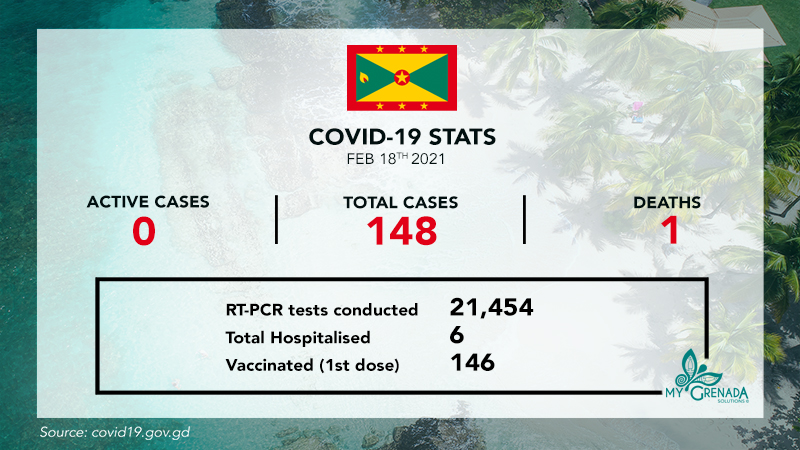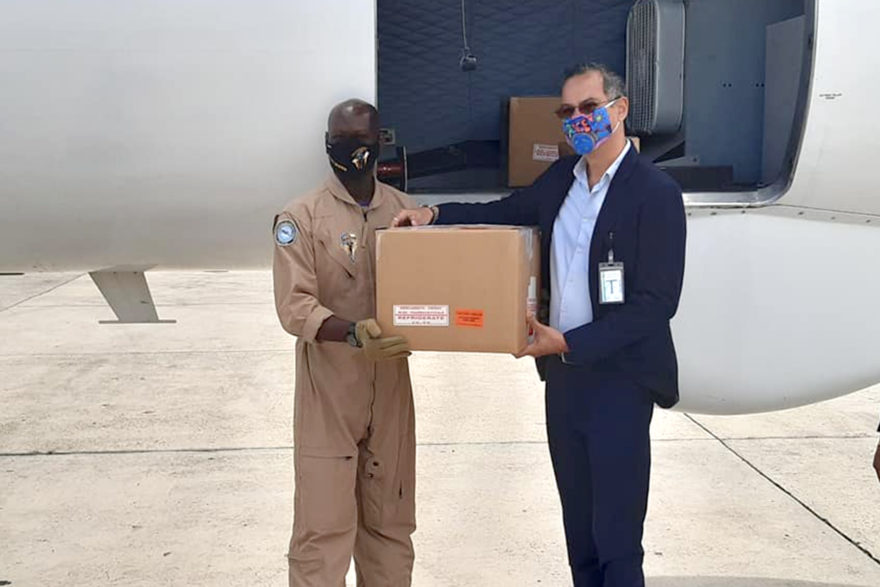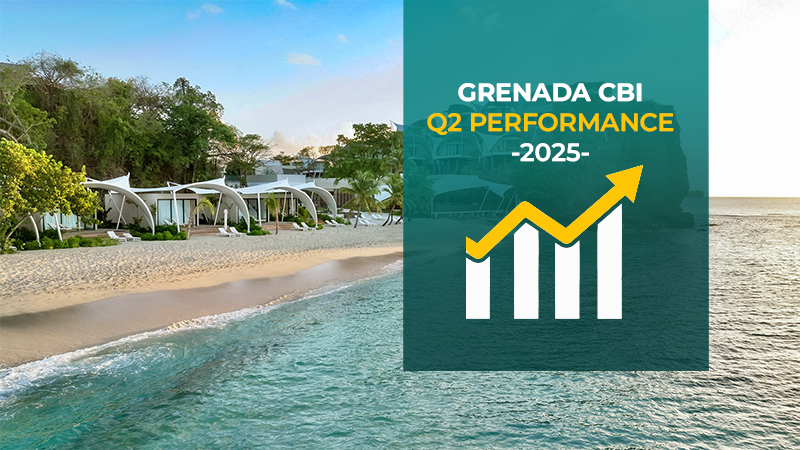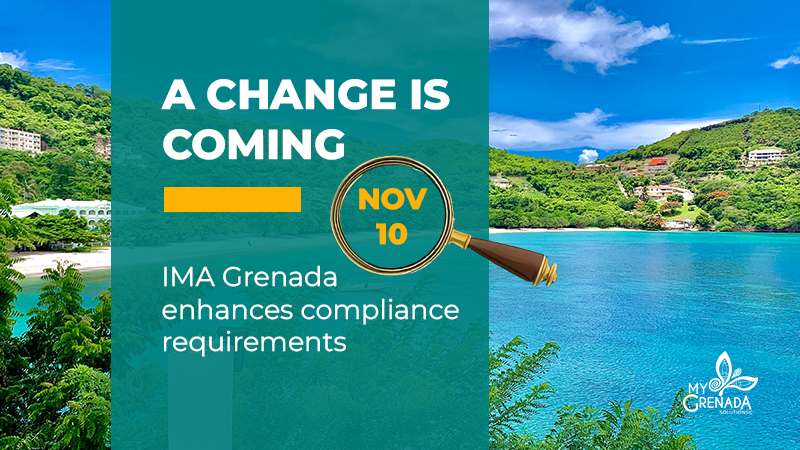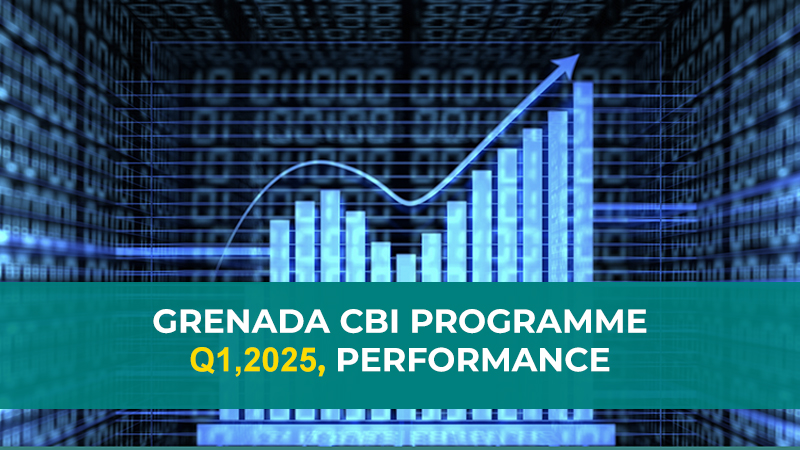Let’s admit it, there’s something special about Grenada. This little Caribbean island has done a pretty good job at defying the odds in managing this deadly global pandemic. At present, Grenada has no active COVID-19 cases. This comes after having recorded 148 cases in total, in which every individual recovered, except for one.
Grenada’s COVID-19 reality, however, didn’t come without its challenges. The country had been quick to react to the pandemic by shutting down its schools in March 2020, before the virus ever reached its shores. Later, it shut down its ports and enforced a 24-hour curfew, all in a bid to manage the spread of infection in Grenada. In so, doing, the island was able to maintain lower double digit infection figures for the greater part of year. However, in December 2020, the comfort and peace of mind Grenadians had come to enjoy, rapidly disappeared. Infection rates began to rise, and the island, which had accumulated a total of 43 laboratory-confirmed cases from March to December 13, suddenly had 59 active cases by December 24.
Spikes, however, are not uncommon in the global construct. One only has to look to Grenada’s neighbouring islands and the greater world as evidence. What is, however, is the ability of countries to quell these spikes and to do so in a short period of time. Grenada has. According to the country’s Minister for Health, the Hon. Nickolas Steele, what sets Grenada apart, are the “subtle differences in our people… government policies, procedures, entry policies, quarantine policies, testing policies,” and more.
With the country having received 3,000 of the Oxford AstraZeneca vaccines, through the COVAX facility on February 10, the Government has started the process of protecting its population from the deadly virus. As of publication, 146 individuals, including Grenada’s Prime Minister, Dr. Keith Mitchell, and Minister Steele, have received the first dose of the vaccine.
Nisha Mc Intyre, the Managing Director of My Grenada Solutions Inc. recently sat down with the health minister to candidly discuss his personal experience post vaccination and his general outlook of his team’s management of the health crisis to date.
What has it been like leading the contingency that has been managing the health of this nation, especially during this global pandemic, and also how have you as a person been able to personally deal with the stress and anxiety of being at the front of this charge, while also managing the ministry of health, while also being a businessman, and also being a family man first and foremost?
Well, it’s been difficult. It’s been a unique life changing experience. In terms of managing it personally… the jury is still out on that. So far, I’ve made it this far. But it’s really… it’s a once in a lifetime, once every hundred-year event or so, and it’s been something – fortunately, or unfortunately – that I drew the card, so therefore the responsibility has been mine to get us through this.
How would you say that you’ve grown as a minister and as a person throughout this entire experience?
Oh, I truly believe I can take on anything else now. There is nothing more that can be thrown at me that I don’t think I will be willing to accept, take on, or live up to the challenge. This has been one that came straight out of left field. It is simply getting past this now, which is going to make a difference now, personally and nationally for us.
We live in a Caribbean where we’re surrounded by other nations, who themselves are struggling to deal with this pandemic and many of them have been where we are now, where it was under control, but then they had spikes, and haven’t been able to get it back under control. What do you think sets Grenada apart in its ability to successfully tackle and quell the upsurges we’ve had in the rates of infection here?
We are very similar to other Caribbean islands but there are subtle differences. There are subtle differences in our people. There are subtle difference in government policies, procedures, entry policies, quarantine policies, testing policies. Those have to be taken into account as well. But I think significantly, [it] has been our government’s ability to make decisions in a timely manner; make sometimes tough decisions, but decisions that have shown to be the correct ones; and take the bitter medicine early in order to stop the spread as quickly as possible. It has come at a significant economic price. It has come at a significant psychological price – not just personally, but to the nation. The nation’s psyche as a whole I think has paid a price. But we believe that that first lost, so to speak, is the best one to take. We regret what we see happening with our neighbours. Our hearts go out to them, and we offer any assistance or advice. We’re here for them the same way we know they would be here for us.
Last week, we had the opportunity to see you and a couple other ministers and our prime minister take the first dose of the AstraZeneca vaccine, what has been your experience since taking your dosage and did you have any anxiety for what would happen post vaccination?
Not really. No, I have had faith in the science. I have been fortunate enough while going through this of also being a director on the WHO as minister of health for Grenada. So, I’ve been interacting with many colleagues at the highest levels. And I have every faith in WHOs process of selection and approval for emergency use of vaccines, and therefore, we have stuck to our principle that we would not use a vaccine unless it was approved by WHO PAHO, and therefore once the vaccine that I was going to be inoculated with was one that was approved, I was quite comfortable with it. I’ve had no side effects. It has been a confidence booster; and I do see it with my other colleagues, up to those who have received today. It really has made a difference, subtle though, but psychologically [it] has made a difference to me.
When are you expected to take the second vaccine?
My second dose, I’m scheduled to take it on the 9th April – 8 weeks from the first dose.
WHO indicates that the efficacy of this particular brand of vaccine increases throughout the 12 week period from the first dosage to the second dosage – up to 80%, which means there’s still a risk factor for infection, even with vaccination. Has the government considered any sort of PR initiative to sensitise and get Grenadians aware that even with vaccination there is still a risk for infection?
Two things there: one, the efficacy rate is up to about 90% now. Technically that’s the same rate of accuracy on the PCR test, which is widely accepted to identify the virus as well. I believe personally, and we believe within the Ministry of Health Grenada that once an individual is vaccinated with both doses that their body will be able to handle it. Now individuals will still get COVID-19 but their body will be able to deal with it and the risks are significantly reduced. Reduced almost to a negligible level. Between now and then we still have to exercise our caution, because there are others around us that are not yet vaccinated; vulnerable individuals as well, and we all have to get to our second dose.
What is the anticipated roll out scheduled for this batch of the vaccine? WHO has their own prioritisation roadmap. Are we following their roadmap, or have we designed one based on our own unique circumstances here?
This present batch of 6,000 doses we expect to use up before the end of this month. So, within the next two weeks. We are following the procedure guidelines of WHO Pan American Health in terms of frontline workers first, then our elderly and persons with comorbidities. The difference or slight variance, because of Grenada, and the fact that we are tourism based, is that individuals within the hospitality sector are also considered to be second level/frontline.
Is there a situation where there will be a charge for the vaccine, or will everyone get the vaccine for free?
Yes, there will be a charge. For instance, we have 8,000 St. George’s University students. So, in us procuring for them, they would pay for their students to get vaccinated, unless their students can get vaccinated in their home countries before they come back. Within the hospitality sector as well, there has been a willingness and an intention to have individuals pay for their vaccines. The first set of vaccines are donated or come without any cost to Grenada. But in order to fill the entire amount needed nationally, there will be a charge. Those who can afford will help subsidise for those who can’t.
Do you envision people being able to pay to get theirs quicker?
It has been discussed. …I prefer to look at it not as individuals paying to get their vaccine quicker, but as government making sure it makes available the vaccine to the more vulnerable and those, who may have difficulty affording it, and then allow the private sector… private doctors, private clinics, etc, to have access to the vaccines, so that we all move forward collectively. The assumption is that in that instance, they may charge their clients for the vaccine. In the interim though, we want to make sure that it’s not about those who can afford to, get it first. We want to make sure most definitely that it is frontline and the most vulnerable. As we get to the end dates – close to the 50% vaccinated, 60% vaccinated, we may allow that to happen.
How much individuals do you anticipate we will be able to vaccinate before the end of this year?
We are looking to get to our mark of 50 – 70% of our population vaccinated by the end of this year. In-fact, before that we have an estimated target of 1,500 to 2,000 individuals per day being vaccinated – being able to possibly run that at seven days a week. That is, with the engagement of our other stakeholders like St. George’s University and the private sector. The restrictions on how quickly we will get to that figure is not just based on our capacity. It is going to be based on vaccine acceptance by the population as well.
In terms of the brand of the vaccine, why was AstraZeneca selected; and did the government have a say in terms of the brand of vaccine that was received here?
We did have a say. First and foremost, the brands that we look at would only be those that are approved for emergency use by WHO Pan American Health. At present, AstraZeneca, Pfizer are approved, and Moderna. It is impossible for us to get our hands on Moderna, because contractually they are bound to supply only the US. We do have facilities on island for the extreme cold chain that the Pfizer biotech vaccine has. The AstraZeneca does not need that cold chain. So, our first choice in all of those three was the AstraZeneca because it doesn’t have the challenges of the extreme cold chain. But we would access, if we were able to get our hands on it, some of the Pfizer doses, and we are looking at some of the other vaccines that are soon to receive EUL (emergency use list) from WHO, which would be probably the Sputnik and the Sinopharm. Those would be vaccines that we would also be looking to add into our formulary.
Is there anything you would like for Grenadians, or even Grenadians in the diaspora, or foreign investors to know about the island in terms of how we have been coping with COVID, or your expectations looking forward given our current circumstances? How do you think Grenada will ride out the rest of this COVID wave, at least for the next quarter, first half of the year?
We are a small country and as such there have been significant challenges in getting prepared for dealing with this vaccine; in being able to put certain social structures in place for individuals who are unemployed. We don’t have the ability that many first world nations have but we have used the resources, what little we have, and the ingenuity of our people to put together a plan that has thus far, with the grace of God, has worked and we intend to continue to place all of our energy on this. We intend to get through this. Because that same issue of size that restricts our ability to respond ideally, also is a benefit with respect to coming out of this pandemic; with the respect of the size of the population to be vaccinated; and also, how quickly we can bounce back. The one thing that I tell my team and I keep focusing on myself, is that after the last pandemic of the 1918’s, there was a period of the roaring twenties, and we are looking forward once we have passed this hurdle, to be open and to experience the roaring 2020’s post COVID 19.


